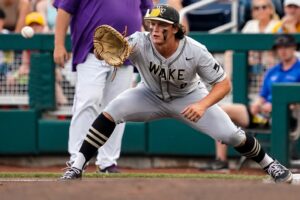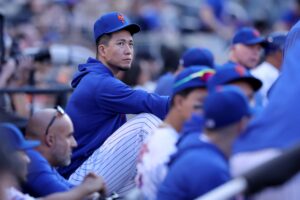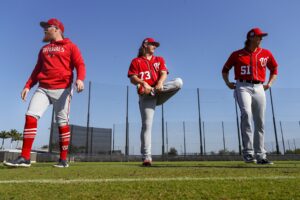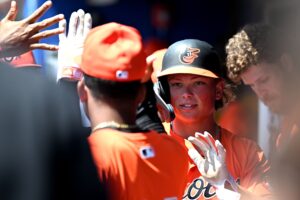Minutes before the July 31 trade deadline in 1998, a major trade was announced. The Seattle Mariners would be sending Randy Johnson to the Houston Astros for three minor leaguers. Those three minor leaguers turned out to be Freddy Garcia, Carlos Guillen, and John Halama. This trade would end up affecting a third team as well once the 1999 season rolled around. Let’s go back to 1998 and revisit the Randy Johnson trade.
Revisiting the Randy Johnson Trade
Why Seattle Made the Trade
As the 1998 season started, hopes were high for the Seattle Mariners. Coming off their second playoff appearance in three years, many thought they would be returning again. However, Randy Johnson was upset that the team had not offered him an extension before the season. With the back issue of 1996 still in the Mariners mind, as well as Johnson now at age-34, the team was skeptical. After finishing second in Cy Young voting in 1997, the Mariners felt like they could wait on Johnson. Things changed quickly as the team went 8-20 in June and began looking to unload Johnson, knowing he was unlikely to re-sign.
Enter Houston. With a core of young talented prospects, a trade partner was found. Getting a trio of young, controllable prospects seemed like the right move for the Mariners. Garcia, Halama, and Guillen all contributed down the line, and this package would normally be considered a decent haul in a trade.
Why Houston Made the Trade
Houston was looking to make it to the playoffs and saw an opportunity to get a top ace. The Astros instantly became a favorite to make the World Series upon acquiring Johnson. The Astros had a great offense as well, with Craig Biggio, Jeff Bagwell, Moises Alou, and Carl Everett. After finishing first in the division in 1997 with 84 wins, Johnson presented them with a fantastic opportunity to improve. The other four starters, Shane Reynolds, Jose Lima, Mike Hampton, and Sean Bergman all finished with an ERA under four. Given the chance to get Johnson, the deal was a no-brainer for Houston.
Immediate impact in Seattle
There was no immediate impact in Seattle during 1998. None of the three involved in the trade played in the majors that season. Halama would have been the most likely player to see big league time in Seattle if he was traded right away. He was instead added as a player to be named later and wouldn’t see the mound for the Mariners until 1999.
Immediate impact in Houston
The trade couldn’t have gone any better in 1998 for Houston. Johnson went 10-1 with a 1.28 ERA, throwing four shutouts. Johnson only made 11 starts once he got to Houston, but he still finished seventh in Cy Young voting. The Astros won their division with 104 wins and faced off with the San Diego Padres in the divisional round. Unfortunately for Houston, the bats were asleep during the series. Johnson went 0-2 with a 1.93 ERA, and the Astros lost the series 3-1. Those would be the last starts Johnson would make with Houston.
Long-Term Impacts in Seattle
All three players made an impact in Seattle during their time there. Halama was the least impactful, posting a 4.46 ERA with the team. 1999 was a good season for Halama with 4.7 WAR, but he quickly fell off becoming a replacement level pitcher. Carlos Guillen took until 2000 to start playing but was a key cog to the Mariners through 2003. Guillen put together the best defensive season of his career in 2001, helping the team get to 116 wins. Providing a 10.8 War over four seasons as a starter, Guillen’s best years came after he left the Mariners and went to the Detroit Tigers.
The biggest win for the Mariners in the trade was Garcia. Instantly showing the ability to be a horse his rookie year, Garcia threw 201 innings in 1999. He finished second in Rookie of the Year voting and ninth in Cy Young voting. He followed that up with All-Star appearances in 2001 and 2002, as well as finishing third in Cy Young voting in 2001. All three of these players ended up being gone by the trade deadline in 2004.
Long-Term Impacts in Houston
Houston didn’t miss Johnson in 1999 as they once again won the division, albeit losing in the division series again. The Astros wouldn’t win a playoff series until 2004. The trade didn’t seem to have much of an impact on Houston long-term. They did lose three future major leaguers in the trade, and Johnson chose not to re-sign. Houston continued to make playoff pushes, but missed out on one of the most dominant runs of a starting pitcher in recent history.
Biggest Impact of all
The biggest impact of all just so happened to end up in Arizona. Johnson went on to have arguably the most dominant four-year run by a starting pitcher in history. At 35-years old heading into the 1999 season, Johnson won four straight Cy Young awards and compiled 31 complete games. He lad the league in ERA three of the four years, and struck out 1,417 people in 1,030 innings! After a down 2003, Johnson was back to form at age-40 in 2004. He registered a perfect game against the Atlanta Braves and was robbed of a Cy Young, despite a 2.60 ERA, while leading the league in WAR and strikeouts.
Both Houston and Seattle ended up being happy with what they got in the trade. Seattle was set up for the next five years with a nice young core. Houston had the best team on paper for the remainder of 1998. Both of these teams pale in comparison to the Arizona Diamondbacks, the true winners of the Randy Johnson trade.
Main Photo:
Embed from Getty Images






